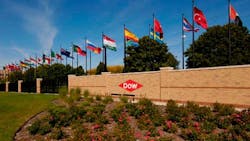Dow-DuPont Deal Wins Conditional Antitrust Approval From EU
Dow Chemical Co. (IW 500/23) and DuPont Co. (IW 500/46) won European Union approval for a $77 billion merger, overcoming regulators’ concerns with hefty concessions, including the sale of large parts of DuPont’s global pesticide business.
The takeover, announced a year ago, is the first to win EU approval out of a trio of mega-deals that would reshape the global agrochemicals industry. The transactions, including Bayer AG’s plan to buy Monsanto Co. and China National Chemical Corp.’s agreement to buy Syngenta AG, would whittle down six industry players to three behemoths in America, Germany and China.
The EU said the combination could have halted work on new chemical products in areas where Dow and DuPont currently compete head-to-head. There was "specific evidence" that the pair would have cut back on the amount they spent on developing products, the European Commission said in an emailed statement. Only Bayer AG, BASF SE and Syngenta match the two firms in discovering, developing and selling agrochemicals.
Innovation Check
"We always look at what a merger would change not just today but also tomorrow," EU Competition Commissioner Margrethe Vestager told reporters at a Brussels press conference. "It is just as important to make sure" mergers don’t "reduce innovation for new and better products."
DuPont has agreed to divest "a significant part" of its existing pesticide business, including R&D activities. That covers herbicides for cereals, oilseed rape, sunflower, rice and pasture as well as insecticides used for fruit and vegetables. The sale includes plants where the products are made and relevant personnel. DuPont’s "global R&D organization" will mostly be sold too. Dow will sell two plants in Spain and the U.S. that make acid co-polymers.
Regulatory Milestone
“This regulatory milestone is a significant step toward closing the merger transaction, with the intention to subsequently spin into three independent publicly traded companies," Dow and DuPont said in a joint statement. The concessions to the EU still ensure "the strategic logic and value creation potential of the transaction," they said.
Vestager said the choice of buyer for their assets was up to Dow and DuPont but that a potential purchaser would need to have the necessary resources to make the new business viable without triggering new antitrust concerns.
"It’s not easy to find buyers of this sort," she said. It "remains to be seen who they choose."
Merger Wave
BASF SE attended a closed-door hearing with regulators on the deal earlier this year, which may show its interest in acquiring assets sold by Dow and DuPont. FMC Corp. and American Vanguard Corp. have said they might want to pick up businesses sold by others in the current merger wave.
ChemChina and Syngenta have an April 12 deadline for an EU decision, and the companies have also made concessions to try to win over regulators. Bayer plans to file for EU approval of the $66 billion purchase in the second quarter after regulators sought more information.
Syngenta expects regulatory approval "in the near term" and has "agreed in principle with the EU and the U.S. regulators on what needs to happen," Chief Executive Officer Erik Fyrwald told Bloomberg News in an interview on Monday. "We’ve reached the point where there is agreement and the process is moving forward."
"We’ve gotten unprecedented amounts of data requests" from officials, which surged after the Bayer-Monsanto deal was announced last year, he said. "We understand that this is a big change for the industry, that there are a lot of moving parts that the regulators need to make very informed decisions."
Vestager said three mega-deals are "very different" and raise separate concerns. Regulators will deal with them as "first come, first served," she said, which means that the Bayer-Monsanto review will have to cope with "the market situation of the mergers ahead of them."
With the EU approval of Dow-DuPont, attention moves to the U.S., where the Justice Department is also expected to require divestitures before approving the tie-up, according to a person familiar with the matter. Timing on that decision, or what assets the antitrust division will require be sold, isn’t yet clear.
Vestager said there was "very close contact" with the U.S. officials to compare notes on the Dow-DuPont tie-up. The EU said it was also in touch with the competition authorities of Australia, Brazil, Canada, Chile, China and South Africa.
Vestager said she didn’t know if the U.S. conclusions on the Dow-DuPont deal "will completely match" the EU.
Ahead of Monday’s decision, environmental campaigners renewed calls for the EU to block all three deals, saying the combined companies would control around 70% of the world’s agrochemicals and more than 60% of commercial seeds.
"Through dominant market share and sheer political power, they would unduly influence our agriculture and food system," Friends of the Earth Europe, Greenpeace and others said in an open letter. "These mergers risk major monopoly outcomes" that might increase prices for farmers and customers.
By Aoife White
About the Author
Bloomberg
Licensed content from Bloomberg, copyright 2016.
